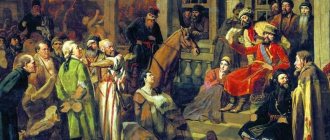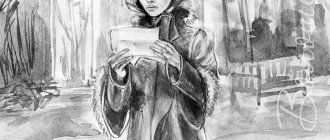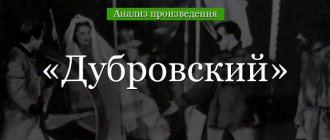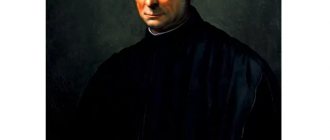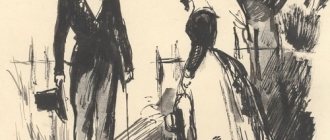Chapter V
The funeral took place on the third day. The body of the poor old man lay on the table, covered with a shroud and surrounded by candles. The dining room was full of courtyard servants. We were getting ready to take it out. Vladimir and three servants lifted the coffin. The priest went forward, the sexton accompanied him, chanting funeral prayers. The owner of Kistenevka crossed the threshold of his house for the last time. The coffin was carried by the grove. The church was behind it. The day was clear and cold. Autumn leaves fell from the trees.
When leaving the grove, we saw the Kistenevsky wooden church and a cemetery shaded by old linden trees. The body of Vladimir’s mother rested there; there, near her grave, a fresh hole had been dug the day before.
The church was full of Kistenevsky peasants who had come to pay their last respects to their master. Young Dubrovsky stood at the choir; he did not cry or pray - but his face was scary. The sad ritual is over. Vladimir was the first to go to say goodbye to the body, followed by all the servants - they brought the lid and nailed down the coffin. The women howled loudly; the men occasionally wiped away tears with their fists. Vladimir and the same three servants carried him to the cemetery, accompanied by the entire village. The coffin was lowered into the grave, everyone present threw a handful of sand into it, filled the hole, bowed to it and dispersed. Vladimir hastily left, got ahead of everyone and disappeared into the Kistenevskaya Grove.
Egorovna, on his behalf, invited the priest and the entire church clergy to a funeral dinner, declaring that the young master did not intend to attend it, and thus Father Anton, the priest Fedotovna and the sexton went on foot to the master's courtyard, discussing with Egorovna about the virtues of the deceased and that , which apparently awaited his heir. (Troekurov’s arrival and the reception he received were already known to the entire neighborhood, and the politicians there foreshadowed important consequences for it.)
“What will be will be,” said the priest, “but it’s a pity if Vladimir Andreevich is not our master.” Well done, nothing to say.
“And who else but him should be our master,” Yegorovna interrupted. “It’s in vain that Kirila Petrovich gets excited. He did not attack the timid: my falcon will stand up for itself, and, God willing, its benefactors will not abandon it. Kirila Petrovich is painfully arrogant! and I suppose he put his tail between his legs when Grishka shouted to him: “Get out, old dog! Out of the yard!
“Ahti, Yegorovna,” said the sexton, “how Grigory’s tongue turned; I would rather agree, it seems, to bark at the Bishop than to look askance at Kiril Petrovich. When you see him, you feel fear and trembling and sweat dripping, but your back just bends and bends...
“Vanity of vanities,” said the priest, “and they will sing eternal memory to Kiril Petrovich, just like now for Andrei Gavrilovich, perhaps the funeral will be richer and more guests will be called, but who cares to God!”
- Oh, dad! and we wanted to invite the whole neighborhood, but Vladimir Andreevich didn’t want to. We probably have enough of everything, we have something to treat, but what do you want to do? At least, if there are no people, then at least I will treat you, our dear guests.
This affectionate promise and the hope of finding a tasty pie quickened the steps of the interlocutors, and they safely arrived at the manor’s house, where the table was already set and vodka was served.
Meanwhile, Vladimir went deeper into the thicket of trees, trying to drown out his spiritual grief with movement and fatigue. He walked without knowing the road; branches constantly touched and scratched him, his foot constantly got stuck in the swamp - he did not notice anything. Finally he reached a small hollow, surrounded on all sides by forest; the stream meandered silently near the trees, half naked in autumn. Vladimir stopped, sat down on the cold turf, and thoughts, one darker than the other, crowded his soul... He felt his loneliness strongly. The future for him was covered with menacing clouds. Enmity with Troekurov foreshadowed new misfortunes for him. His poor property could pass away from him into the wrong hands - in this case, poverty awaited him. For a long time he sat motionless in the same place, looking at the quiet flow of the stream, carrying away a few faded leaves and vividly presenting to him the true likeness of life - a likeness so ordinary. Finally he noticed that it was beginning to get dark; he got up and went to look for the way home, but wandered for a long time through the unfamiliar forest until he found himself on a path that led him straight to the gates of his house.
A priest came across Dubrovsky with all the accolades. The thought of an unlucky omen occurred to him. He involuntarily walked away and disappeared behind a tree. They did not notice him and spoke heatedly to each other as they passed him.
“Get away from evil and do good,” said the priest, “there is no point in us staying here.” It's not your problem, no matter how it ends. - Popadya answered something, but Vladimir could not hear her.
As he approached, he saw a lot of people - peasants and courtyard people crowding into the master's courtyard. From a distance, Vladimir heard an extraordinary noise and conversation. There were two triples standing by the barn. On the porch, several strangers in uniform frock coats seemed to be discussing something.
- What does it mean? - he asked Anton angrily, who was running towards him. - Who are they, and what do they need?
“Ah, Father Vladimir Andreevich,” answered the old man, breathless. - The court has arrived. They are handing us over to Troekurov, taking us away from your mercy!..
Vladimir lowered his head, his people surrounded their unfortunate master. “You are our father,” they shouted, kissing his hands, “we don’t want another master but you, order, sir, we will deal with the trial. We’ll die rather than hand him over.” Vladimir looked at them, and strange feelings worried him. “Stand still,” he told them, “and I’ll talk to the officers.” “Talk, father,” they shouted to him from the crowd, “for the conscience of the damned.”
Vladimir approached the officials. Shabashkin, with a cap on his head, stood with his arms akimbo and proudly looked around him. The police officer, a tall and fat man of about fifty with a red face and a mustache, seeing Dubrovsky approaching, grunted and said in a hoarse voice: “So, I repeat to you what I have already said: according to the decision of the district court, from now on you belong to Kiril Petrovich Troekurov, whose face Mr. Shabashkin represents here. Obey him in everything he orders, and you women love and honor him, and he is a great hunter of you.” At this sharp joke the police officer burst out laughing, and Shabashkin and the other members followed him. Vladimir was seething with indignation. “Let me find out what this means,” he asked the cheerful police officer with feigned cold-bloodedness. “And this means,” answered the intricate official, “that we have come to bring this Kiril Petrovich Troekurov into possession and ask for other
Let’s get out of the way.” - “But you could, it seems, treat me before my peasants, and announce the landowner’s abdication from power...” “Who are you,” said Shabashkin with a bold look. “The former landowner Andrei Gavrilov, son of Dubrovsky, will die by the will of God, we don’t know you, and we don’t want to know you.”
“Vladimir Andreevich is our young master,” said a voice from the crowd.
“Who dared to open his mouth there,” said the police officer menacingly, “what gentleman, what Vladimir Andreevich?” your master Kirila Petrovich Troekurov - do you hear, you idiots?
“How wrong,” said the same voice.
- Yes, this is a riot! - the police officer shouted. - Hey, headman, here!
The headman stepped forward.
- Find out this very hour who dared to talk to me, I him!
The headman addressed the crowd, asking who spoke? but everyone was silent; Soon a murmur arose in the back rows, began to intensify and in one minute turned into the most terrible screams. The police officer lowered his voice and wanted to persuade them. “Why look at him,” the courtyard servants shouted, “guys! Down with them! - and the whole crowd moved. Shabashkin and the other members hastily rushed into the hallway and locked the door behind them.
“Guys, knit,” the same voice shouted, “and the crowd began to press... “Stop,” Dubrovsky shouted. - Fools! what are you? you are ruining both yourself and me. Go through the yards and leave me alone. Do not be afraid, sir, I will ask him. He won't hurt us. We are all his children. How will he stand up for you if you start rebelling and robbing?”
The speech of young Dubrovsky, his sonorous voice and majestic appearance produced the desired effect. The people quieted down, dispersed - the yard was empty. The members sat in the entryway. Finally, Shabashkin quietly unlocked the doors, went out onto the porch and, with humiliated bows, began to thank Dubrovsky for his gracious intercession. Vladimir listened to him with contempt and did not answer. “We decided,” continued the assessor, “with your permission to stay here overnight; otherwise it’s dark, and your men might attack us on the road. Do this kindness: order some hay to be laid out for us in the living room; than light, we will go home.”
“Do what you want,” Dubrovsky answered them dryly, “I’m no longer the boss here.” - With this word, he retired to his father’s room and locked the door behind him.
| « Volume 1, Chapter 4 | Volume 1, Chapter 6" |
"Dubrovsky". Chapter 9 (end)
A. S. PushkinAll eyes turned to Anna Savishna Globova, a rather simple widow, beloved by everyone for her kind and cheerful disposition. Everyone prepared to hear her story with curiosity.
“You need to know that three weeks ago I sent a clerk to the post office with money for my Vanyusha.” I don’t spoil my son, and I’m not able to spoil my son, even if I wanted to; however, please know for yourself: a guard officer needs to support himself in a decent manner, and Vanyusha and I share my income as best I can. So I sent him 2,000 rubles, even though Dubrovsky came to my mind more than once, but I thought: the city is close, only seven miles, maybe God will carry it through. I saw my clerk returning in the evening, pale, ragged and on foot - I just gasped. "What's happened? what happened to you? He told me: “Mother Anna Savishna, the robbers robbed me; they almost killed me, Dubrovsky himself was here, he wanted to hang me; Yes, he took pity and let him go, but he robbed everything, took away both the horse and the cart.” I froze; My Heavenly King, what will happen to my Vanyusha? There is nothing to do: I wrote a letter to my son, told him everything and sent him my blessing without a penny of money.
A week passed, then another, and suddenly a stroller drove into my yard. Some general asks to see me: you are welcome; A man of about thirty-five, dark-skinned, black-haired, with a mustache and beard, a real portrait of Kulnev 3 , comes up to me, recommended to me as a friend and colleague of my late husband Ivan Andreevich; He was driving by and couldn’t help but stop by his widow, knowing that I lived here.
- 3 Kulnev Ya. P. - Russian general; famous for his victories in the Russian-Swedish war of 1808-1809.
I treated him to what God had sent, we talked about this, about that, and finally about Dubrovsky. I told him my grief. My general frowned. “This is strange,” he said, “I heard that Dubrovsky attacks not everyone, but famous rich people, but even here he shares with them, and does not rob him outright, and no one accuses him of murder; Is there any trickery here, order your clerk to be called.” Sent for the clerk, he appeared; As soon as he saw the general, he was dumbfounded. “Tell me, brother, how Dubrovsky robbed you and how he wanted to hang you.” My clerk trembled and fell at the general’s feet. “Father, it’s my fault - it was a sin - I was confused - I lied.” “If that’s the case,” answered the general, “then please tell the lady how the whole thing happened, and I’ll listen.” The clerk could not come to his senses. “Well,” the general continued, “tell me where you met Dubrovsky?” - “At two pines, father, at two pines.” - “What did he tell you?” - “He asked me, whose are you, where are you going and why?” - “Well, what about after?” “And then he demanded a letter and money.” - "Well?" - “I gave him the letter and the money.” - "And he? Well, what about him? - “Father, it’s my fault.” - “Well, what did he do?” - “He returned the money to me and the letter and said: go with God, give this to the post office.” - "Well, what about you?" “Father, it’s my fault.” “I’ll handle it with you, my dear,” the general said menacingly, “and you, madam, order a search of this swindler’s chest and hand it over to me, and I’ll teach him a lesson.” Know that Dubrovsky himself was a guards officer; he will not want to offend his comrade.” I guessed who His Excellency was; I had no need to talk to him about it. The coachmen tied the clerk to the carriage's goats. The money was found; the general dined with me, then immediately left and took the clerk with him. My steward was found the next day in the forest, tied to an oak tree and skinned like a stick.
- And you, Anna Savishna, believe that you had Dubrovsky himself? - asked Kirila Petrovich. - You were very mistaken. I don’t know who was your guest, but not Dubrovsky.
- How, father, not Dubrovsky, and who else if not him, will drive out onto the road and begin to stop passers-by and inspect them.
- I don’t know, and certainly not Dubrovsky. I remember him as a child; I don’t know if his hair turned black, and then he was a curly, blond boy, but I know for sure that Dubrovsky is five years older than my Masha and that, consequently, he is not thirty-five, but about twenty-three.
“That’s right, Your Excellency,” declared the police officer, “I also have signs of Vladimir Dubrovsky in my pocket.” They definitely say that he is twenty-third years old.
- A! - said Kirila Petrovich, - by the way, read it, and we’ll listen; It’s not bad for us to know its signs: maybe it catches your eye, it won’t turn out.
The police officer took a rather soiled piece of paper out of his pocket, unfolded it with importance and began to read in a sing-song voice:
“Signs of Vladimir Dubrovsky, compiled from the tales of 4 of his former servants.
- 4 According to fairy tales - here: according to words.
23 years old, tall
average,
faced
,
beard
,
has brown
eyes hair
,
nose
.
Special signs
: there were none.”
- But only? - said Kirila Petrovich.
“Only,” answered the police officer, folding the paper.
- Congratulations, Mr. Police Officer. Oh yes paper! Based on these signs, it will not be surprising for you to find Dubrovsky. But who is not of average height, who does not have brown hair, a straight nose and brown eyes? I bet you will talk to Dubrovsky himself for three hours straight, and you won’t guess with whom God brought you together. There is nothing to say, smart little heads are orderly!
The police officer humbly put his paper in his pocket and silently began to eat the goose and cabbage.
“No,” continued Kirila Petrovich, “we will never see such a police officer as the deceased Taras Alekseevich was!” This one was no mistake, no mistake. It’s a pity that they burned the fellow, otherwise not a single person in the whole gang would have left him. He would have caught every single one of them - and Dubrovsky himself would not have turned around and paid off. Taras Alekseevich would have taken the money from him, but he wouldn’t let him go: that was the custom of the deceased. There is nothing to do, apparently, I should intervene in this matter and go after the robbers with my family. In the first case, I will detach about twenty people, so they will clear the thieves’ grove; The people are not cowardly, everyone goes after a bear alone, they will not back away from robbers.
- Is your bear healthy, Father Kirila Petrovich? - said Anton Pafnutich, remembering with these words about his shaggy acquaintance and about some jokes, of which he was once a victim.
“Misha ordered me to live long,” answered Kirila Petrovich. - He died a glorious death at the hands of the enemy. There’s his winner,” Kirila Petrovich pointed to Deforge: “exchange the image of my Frenchman.” He avenged your... if I may say so... Do you remember?
“How can I not remember,” said Anton Pafnutich, scratching himself, “I remember very much.” So Misha died. I’m sorry for Misha, by God, I’m sorry! what a funny man he was! what a clever girl! You won’t find another bear like this. Why did Monsieur kill him?
Kirila Petrovich began to tell with great pleasure the feat of his Frenchman, for he had the happy ability to be proud of everything that surrounded him. The guests listened with attention to the story of Misha’s death and looked in amazement at Deforge, who, not suspecting that the conversation was about his courage, sat calmly in his place and made moral comments to his frisky pupil.
Chapter 10 >>>
Volume 1, Chapter 5
The funeral took place on the third day. The body of the poor old man lay on the table, covered with a shroud and surrounded by candles. The dining room was full of courtyard servants. We were getting ready to take it out. Vladimir and three servants lifted the coffin. The priest went forward, the sexton accompanied him, chanting funeral prayers. The owner of Kistenevka crossed the threshold of his house for the last time. The coffin was carried by the grove. The church was behind it. The day was clear and cold. Autumn leaves fell from the trees. When leaving the grove, we saw the Kistenevsky wooden church and a cemetery shaded by old linden trees. The body of Vladimir’s mother rested there; there, near her grave, a fresh hole had been dug the day before. The church was full of Kistenevsky peasants who had come to pay their last respects to their master. Young Dubrovsky stood at the choir; he did not cry or pray - but his face was scary. The sad ritual is over. Vladimir was the first to go to say goodbye to the body, followed by all the servants - they brought the lid and nailed down the coffin. The women howled loudly; the men occasionally wiped away tears with their fists. Vladimir and the same three servants carried him to the cemetery, accompanied by the entire village. The coffin was lowered into the grave, everyone present threw a handful of sand into it, filled the hole, bowed to it and dispersed. Vladimir hastily left, got ahead of everyone and disappeared into the Kistenevskaya Grove. Egorovna, on his behalf, invited the priest and the entire church clergy to a funeral dinner, declaring that the young master did not intend to attend it, and thus Father Anton, the priest Fedotovna and the sexton went on foot to the master's courtyard, discussing with Egorovna about the virtues of the deceased and that , which apparently awaited his heir. (Troekurov’s arrival and the reception he received were already known to the entire neighborhood, and the politicians there foreshadowed important consequences for it.) “What will happen will happen,” said the priest, “but it’s a pity if Vladimir Andreevich is not our master.” Well done, nothing to say. “And who else but him should be our master,” Yegorovna interrupted. “It’s in vain that Kirila Petrovich gets excited. He did not attack the timid: my falcon will stand up for itself, and, God willing, its benefactors will not abandon it. Kirila Petrovich is painfully arrogant! and I suppose he put his tail between his legs when Grishka shouted to him: “Get out, old dog! Out of the yard! “Ahti, Yegorovna,” said the sexton, “how Grigory’s tongue turned; I would rather agree, it seems, to bark at the Bishop than to look askance at Kiril Petrovich. When you see him, you feel fear and trembling and sweat dripping, but your back just bends and bends...
